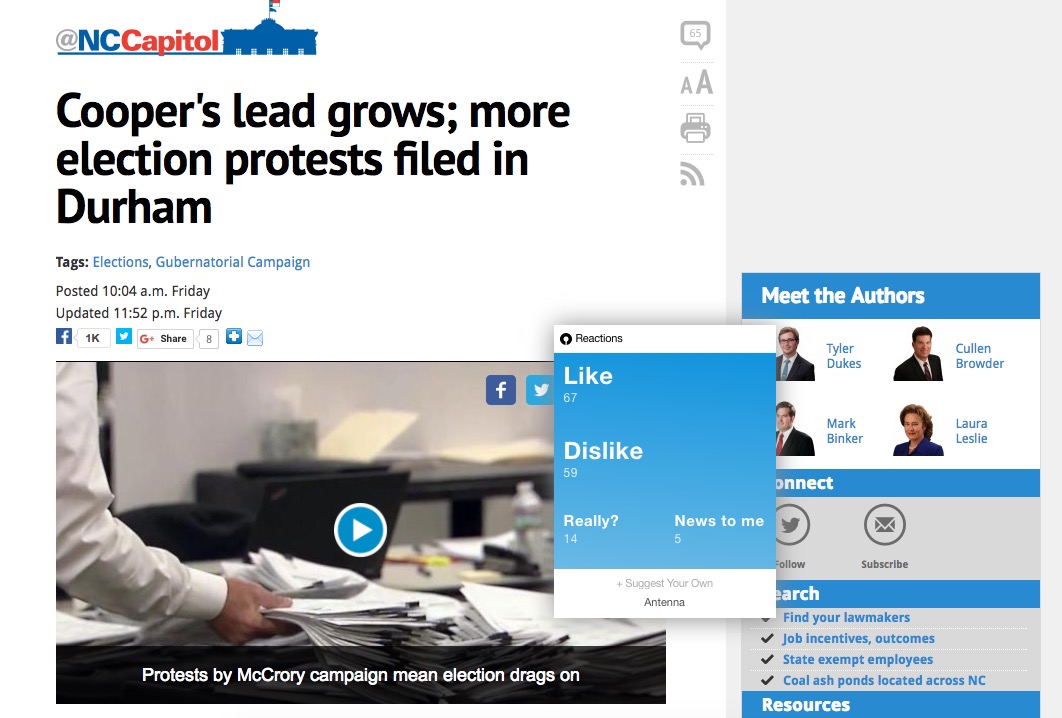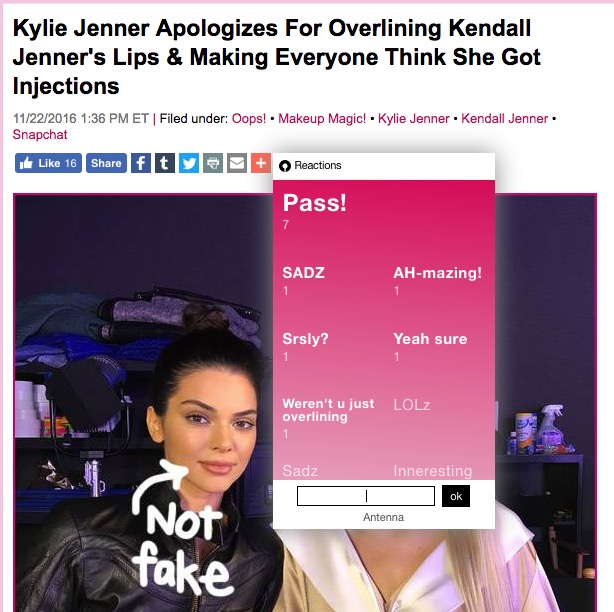
North Carolina’s gubernatorial election was one of the most contested races in the country this year, and with the candidates separated by just about 6,500 votes, the legal wrangling is expected to continue for some time as a recount has been requested.
Opinions across the Tar Heel state are divided about the election, and a story published last Friday by WRAL, an NBC-affiliate based in Raleigh, on the fallout from the race elicited all sorts of responses.
There were more than 60 comments on the story, but in addition to traditional comments, WRAL uses Antenna, a plugin that lets users react to stories by showcasing an emotion. For that story on the governor’s race, there were 144 total reactions: 66 liked it, 59 disliked it, 14 said “really?”, and five chose “news to me.”

Antenna enables readers to react to the story as a whole, to specific passages, or even to photos or videos. Publishers can also tailor the tool to their own site by limiting functionality or enabling specific reactions. On Perez Hilton, another site that uses Antenna, users, for instance, can choose “LOLz,” “Srsly?,” “AH-mazing!,” and more.

WRAL has been using Antenna for more than a year now, and John Conway, general manager of WRAL.com, said the station has been trying to downplay comments — you have to make an extra click to see them and commenters need to authenticate their accounts with Facebook — and Antenna seemed like a lightweight way for users to offer feedback.
“We don’t see it as a tool that’s integral to our success, but we think it is a nice complement to what we already offer, and it provides that opportunity for users to interact with the story in an easy and quick fashion,” Conway said.
Antenna is free, and there are about 30 sites now using it, CEO Porter Bayne told me. A group of 12 or so sites — including WRAL, Perez Hilton, and the Spanish-language version of Digital Trends — that account about 90 percent of the tool’s use.
Antenna says it now gets about 30 million monthly unique users across its sites. The company, Bayne said, has run a number of A/B tests on sites using Antenna. For nine months, it disabled Antenna on 10 percent of the pages on participating publishers.
Visits per month per user increased by 10 percent on average for sites with Antenna on them, and pageviews increased by about 8 percent.
Many news sites have turned away from comments and some are souring on Facebook’s dominance over the information ecosystem. As a result, a number of startups, including Antenna, have popped up to try to help outlets solicit user opinion on their own platforms, and news orgs have experimented as well. The German startup Opinary, for instance, creates embeddable widgets that news orgs can use to measure user sentiment. Another startup, Civil, is trying to recast comments by requiring crowdsourced moderation.“It’s a nearly abuse-proof way to get feedback from an audience, and in a way that reinforces the brand language,” Bayne said. “We don’t think this is a replacement for comments. We think this is another piece in the community ecosystem that people have.”
Antenna launched as a side project in the fall of 2014, and Bayne said it’s been a full-time effort since 2015.
The company sees uses for the platform beyond journalism. This summer, it began working with four different e-commerce sites to use Antenna as a way for shoppers to review products.
The company has raised money through angel and venture funding. Antenna plans to begin monetizing the platform next year with a content recommendation network.
Bayne, in an investor presentation posted on Vimeo last year, said the company expects to make $14.4 million in its third year.
“The publisher can deploy our units and accept third-party content from our network,” Bayne said. Users will then see recommended links to other Antenna partners, and publishers will get a revenue share for clicks.
The technology is pretty simple, Bayne said, but the company needs to build up enough of a network effect to make it feasible. Early tests have shown Antenna’s content recommendation system outperforming site’s own recommended stories by about 5 percent.
It’s aiming to introduce the content recommendation engine this spring.
“We think our signal, that says that 30 people thought that paragraph was funny or 80 people thought that image looked really tasty — we think that’s possibly a better signal for content recommendation than basing things off clicks,” Bayne said.
But for the company to continue to grow, it will need to determine whether it can monetize its network and make it indispensable for publishers.
“What we have to figure out with Antenna…is this actually helping publishers?” said Bayne. “Or is this a nice-to-have community tool that may or may not be moving the needle?”